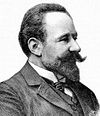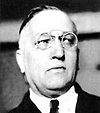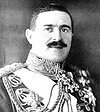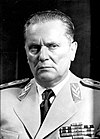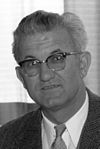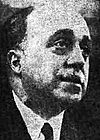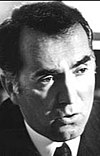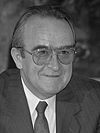Prime Minister of Yugoslavia
| Prime Minister of Yugoslavia | |
|---|---|
| Премијер Југославије Premijer Jugoslavije | |
 Standard of the Prime Minister (SFR Yugoslavia) | |
| Government of Yugoslavia | |
| Member of | Parliament of Yugoslavia |
| Reports to | King of Yugoslavia (Serbs, Croats and Slovenes) (1918–1945) President of Yugoslavia (1945–1971) Presidency of Yugoslavia (1971–1992) |
| Seat | Belgrade, Serbia |
| Nominator | King of Yugoslavia (Serbs, Croats and Slovenes) (1918–1945) Central Committee of the League of Communists of Yugoslavia (1945–1992) |
| Appointer | Parliament of Yugoslavia |
| Precursor | Prime Minister of Serbia President of the National Council of Slovenes, Croats and Serbs |
| Formation | 1 December 1918 |
| First holder | Stojan Protić |
| Final holder | Ante Marković |
| Abolished | 14 July 1992 |
| Superseded by | Prime Minister of Bosnia and Herzegovina Prime Minister of Croatia Prime Minister of North Macedonia Prime Minister of Serbia and Montenegro Prime Minister of Slovenia |
| Deputy | Deputy Prime Minister of Yugoslavia |
The prime minister of Yugoslavia (Serbo-Croatian: Премијер Југославије, Premijer Jugoslavije) was the head of government of the Yugoslav state, from the creation of the Kingdom of Serbs, Croats and Slovenes in 1918 until the breakup of the Socialist Federal Republic of Yugoslavia in 1992.
History[edit]
Kingdom of Yugoslavia[edit]
The Kingdom of Serbs, Croats and Slovenes was created by the unification of the Kingdom of Serbia (Montenegro had united with Serbia five days previously, while the regions of Kosovo and Metohija, Baranya, Syrmia, Banat, Bačka and Vardar Macedonia were parts of Serbia prior to the unification) and the provisional State of Slovenes, Croats and Serbs (itself formed from territories of the former Austria-Hungary) on 1 December 1918.
Until 6 January 1929, the Kingdom of Serbs, Croats and Slovenes was a parliamentary monarchy. On that day, King Alexander I abolished the Vidovdan Constitution (adopted in 1921), prorogued the National Assembly and introduced a personal dictatorship (so-called 6 January Dictatorship).[1] He renamed the country Kingdom of Yugoslavia on 3 October 1929, and although introduced the 1931 Constitution, he continued to rule as a de facto absolute monarch until his assassination on 9 October 1934, during a state visit to France. After his assassination, parliamentary monarchy was put back in place.
The Kingdom of Yugoslavia was defeated and occupied on 17 April 1941 after the German invasion. The monarchy was formally abolished and the republic proclaimed on 29 November 1945.
SFR Yugoslavia[edit]
After the German invasion and fragmentation of the Kingdom of Yugoslavia, the Partisan resistance in occupied Yugoslavia formed a deliberative council, the Anti-Fascist Council of National Liberation of Yugoslavia (AVNOJ) in 1942. On 29 November 1943 the AVNOJ proclaimed the Democratic Federal Yugoslavia, and appointed the National Committee for the Liberation of Yugoslavia (NKOJ), led by Prime Minister Josip Broz Tito, as its government. Josip Broz Tito was quickly recognized by the Allies at the Tehran Conference, and the royalist government-in-exile in London was pressured into agreeing on a merge with the NKOJ. In order to facilitate this, Ivan Šubašić was appointed by the King to head the London government.
For a period, Yugoslavia had two recognized prime ministers and governments (which both agreed to formally merge as soon as possible): Josip Broz Tito leading the NKOJ in occupied Yugoslavia, and Ivan Šubašić leading the King's government-in-exile in London. With the Tito-Šubašić Agreement in 1944, the two prime ministers agreed that the new joint government would be led by Tito. After the liberation of Yugoslavia's capital Belgrade in October 1944, the joint government was officially formed on 2 November 1944, with Josip Broz Tito as the prime minister.
After the war, elections were held ending in an overwhelming victory for Tito's People's Front. The new parliament deposed King Peter II on 29 November 1945, and declared a Federal People's Republic of Yugoslavia (in 1963, the state was renamed Socialist Federal Republic of Yugoslavia). The government was first headed by a prime minister up to 14 January 1953, when major decentralization reforms reorganized the government into the Federal Executive Council chaired by a President, who was still usually called "Prime Minister" in non-Yugoslav sources. Josip Broz Tito held the post from 1944 to 1963; from 1953 onward, he was also President of the Republic.
Five out of nine heads of government of Yugoslavia in this period were of Croatian ethnicity. Three were from Croatia itself (Josip Broz Tito, Mika Špiljak, and Milka Planinc), while two were Bosnian Croats (Branko Mikulić and Ante Marković). Ante Marković however, though a Croat from Bosnia and Herzegovina by birth, was a politician of Croatia like Špiljak and Planinc, serving (at different times) as both prime minister and president of the presidency of that federal unit.
List[edit]
| No. | Portrait | Name (Birth–Death) |
Ethnicity | Term of office | Political party | Election | Cabinet | Notes | ||
|---|---|---|---|---|---|---|---|---|---|---|
| Took office | Left office | Time in office | ||||||||
| In the Kingdom of Yugoslavia | ||||||||||
| – | Nikola Pašić (1845–1926) Acting | Serb | 1 December 1918 | 22 December 1918 | 21 days | NRS | – | Pašić XII | Acting prime minister, as the last prime minister of Serbia. | |
| 1 | Stojan Protić (1857–1923) | Serb | 22 December 1918 | 16 August 1919 | 237 days | NRS | – | Protić I | First Prime Minister of the Kingdom of Serbs, Croats and Slovenes (that will be renamed to "Yugoslavia"). | |
| 2 | Ljubomir Davidović (1863–1940) | Serb | 16 August 1919 | 19 February 1920 | 187 days | DS | – | Davidović I | . | |
| (1) | Stojan Protić (1857–1923) | Serb | 19 February 1920 | 16 May 1920 | 87 days | NRS | – | Protić II | . | |
| 3 | Milenko Vesnić (1863–1921) | Serb | 16 May 1920 | 1 January 1921 | 230 days | NRS | 1920 | Vesnić | . | |
| 4 | Nikola Pašić (1845–1926) | Serb | 1 January 1921 | 28 July 1924 | 3 years, 209 days | NRS | 1923 | Pašić XIII–XIV–XV–XVI–XVII–XVIII–XIX | Second term. Vidovdan Constitution adopted on June 28, 1921. | |
| (2) | Ljubomir Davidović (1863–1940) | Serb | 28 July 1924 | 6 November 1924 | 101 days | DS | – | Davidović II | Second term | |
| (4) | Nikola Pašić (1845–1926) | Serb | 6 November 1924 | 8 April 1926 | 1 year, 153 days | NRS | 1925 | Pašić XX–XXI–XXII | Third term | |
| 5 | Nikola Uzunović (1873–1954) | Serb | 8 April 1926 | 17 April 1927 | 1 year, 9 days | NRS | – | Uzunović I–II | . | |
| 6 | Velimir Vukićević (1871–1930) | Serb | 17 April 1927 | 28 July 1928 | 1 year, 102 days | NRS | 1927 | Vukićević I–II | Resigned after assassination attempt on opposition leader Stjepan Radić in the Parliament. | |
| 7 | Anton Korošec (1872–1940) | Slovene | 28 July 1928 | 7 January 1929[1] | 163 days | SLS | – | Korošec | Appointed after the assassination attempt on Stjepan Radić, until the 6 January Dictatorship. | |
| 8 | Petar Živković (1879–1947) | Serb | 7 January 1929[1] | 4 April 1932 | 3 years, 88 days | JNS | 1931 | Živković | Prime Minister during the 6 January Dictatorship. Sentenced to death in absentia in 1946. | |
| 9 | Vojislav Marinković (1876–1935) | Serb | 4 April 1932 | 3 July 1932 | 90 days | JNS | – | Marinković | Previously a (founding) member of the Democratic Party. | |
| 10 | Milan Srškić (1880–1937) | Serb | 3 July 1932 | 27 January 1934 | 1 year, 208 days | JNS | – | Srškić I–II | . | |
| (5) | Nikola Uzunović (1873–1954) | Serb | 27 January 1934 | 22 December 1934 | 329 days | JNS | – | Uzunović III | The Yugoslav Radical Peasants' Democracy party was renamed into the Yugoslav National Party. | |
| 11 | Bogoljub Jevtić (1886–1960) | Serb | 22 December 1934 | 24 June 1935 | 184 days | JRZ JNS | 1935 | Jevtić | . | |
| 12 | Milan Stojadinović (1888–1961) | Serb | 24 June 1935 | 5 February 1939 | 3 years, 226 days | JRZ | 1938 | Stojadinović I–II–III | . | |
| 13 | Dragiša Cvetković (1893–1969) | Serb | 5 February 1939 | 27 March 1941 | 2 years, 50 days | JRZ | – | Cvetković I–II | Sentenced in absentia in 1945.[2] | |
| In the Yugoslav government-in-exile | ||||||||||
| 14 | Dušan Simović (1882–1962) | Serb | 27 March 1941 | 11 January 1942 | 290 days | Independent | – | Simović | Chief of the General Staff of the Royal Yugoslav Army. Took power by military coup d'état. He led government into exile in London. | |
| 15 | Slobodan Jovanović (1869–1958) | Serb | 11 January 1942 | 26 June 1943 | 1 year, 166 days | Independent | – | Jovanović I-II | Headed government-in-exile. Found guilty of treason in absentia in 1946. | |
| 16 | Miloš Trifunović (1871–1957) | Serb | 26 June 1943 | 10 August 1943 | 45 days | NRS | – | Trifunović | Headed government-in-exile | |
| 17 | Božidar Purić (1891–1977) | Serb | 10 August 1943 | 8 July 1944 | 333 days | Independent | – | Purić | Headed government-in-exile | |
| 18 | Ivan Šubašić (1892–1955) | Croat | 8 July 1944 | 2 November 1944 | 117 days | HSS | – | Šubašić | Headed government-in-exile. Merged into coalition government on November 2, 1944, with Josip Broz Tito presiding.[3][4] | |
| In the Socialist Federal Republic of Yugoslavia | ||||||||||
| 19 (1) | Josip Broz Tito (1892–1980) | Croat | 2 November 1944 | 29 June 1963 | 18 years, 239 days | SKJ SKJ | 1945 1950 1953 1958 1963 | Tito I–II–III–IV–V–VI | Held post simultaneously (as head of the NKOJ) first with Božidar Purić, then Ivan Šubašić. Headed joint coalition government. | |
| 20 (2) | Petar Stambolić (1912–2007) | Serb | 29 June 1963 | 16 May 1967 | 3 years, 321 days | SKJ | – | Stambolić | . | |
| 21 (3) | Mika Špiljak (1916–2007) | Croat | 16 May 1967 | 18 May 1969 | 2 years, 2 days | SKJ | – | Špiljak | . | |
| 22 (4) | Mitja Ribičič (1919–2013) | Slovene | 18 May 1969 | 30 July 1971 | 2 years, 73 days | SKJ | 1969 | Ribičič | . | |
| 23 (5) | Džemal Bijedić (1917–1977) | Bosniak | 30 July 1971 | 18 January 1977 † | 5 years, 172 days | SKJ | 1974 | Bijedić I-II | Killed in a plane crash.[5] | |
| 24 (6) | Veselin Đuranović (1925–1997) | Montenegrin | 18 January 1977[6] | 16 May 1982 | 5 years, 118 days | SKJ | 1978 | Đuranović | . | |
| 25 (7) | Milka Planinc (1924–2010) | Croat | 16 May 1982 | 15 May 1986 | 3 years, 364 days | SKJ | 1982 | Planinc | First female head of the government. | |
| 26 (8) | Branko Mikulić (1928–1994) | Croat | 15 May 1986 | 16 March 1989 | 2 years, 305 days | SKJ | 1986 | Mikulić | Resigned on 30 December 1988, amid widespread protests. | |
| 27 (9) | Ante Marković (1924–2011) | Croat | 16 March 1989 | 20 December 1991 | 2 years, 279 days | SKJ SRSJ | 1989 | Marković | Last prime minister of Yugoslavia. League of Communists was dissolved in 1990, Marković formed his own party. | |
| – | Aleksandar Mitrović (1933–2012) Acting | Serb | 20 December 1991 | 14 July 1992 | 207 days | SPS | – | Marković | Acting prime minister. Installed by Serbia and Montenegro. | |
Timeline[edit]

See also[edit]
- Deputy Prime Minister of Yugoslavia
- List of heads of state of Yugoslavia
- Prime Minister of Serbia and Montenegro
- Chairman of the Council of Ministers of Bosnia and Herzegovina
- Prime Minister of Croatia
- Prime Minister of Montenegro
- Prime Minister of North Macedonia
- Prime Minister of Serbia
- Prime Minister of Slovenia
References[edit]
- ^ a b c Edwin Leland James (7 January 1929). "KING OF YUGOSLAVIA ASSUMES ALL POWER". The New York Times. Retrieved 12 August 2021.
- ^ Rehabilitovan Dragiša Cvetković
- ^ Lampe, John R.; Yugoslavia as history: twice there was a country; Cambridge University Press, 2000 ISBN 0-521-77401-2
- ^ Ramet, Sabrina P.; The three Yugoslavias: state-building and legitimation, 1918-2005; Indiana University Press, 2006 ISBN 0-253-34656-8
- ^ Malcolm Browne (19 January 1977). "Bijedic, Yugoslav Prime Minister, Is Killed in Crash of Executive Jet". The New York Times. Retrieved 13 August 2021.
- ^ "Montenegrin Is Appointed Premier of Yugoslavia". The New York Times. 16 March 1977. Retrieved 13 August 2021.





